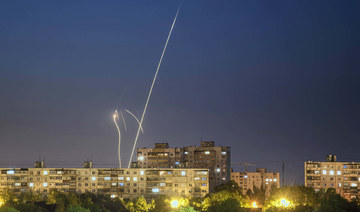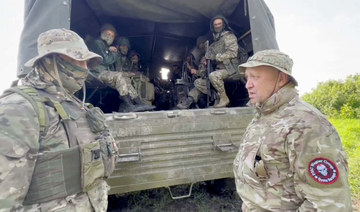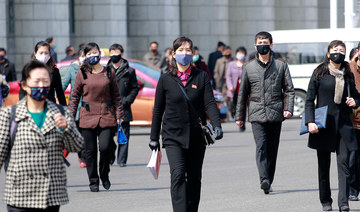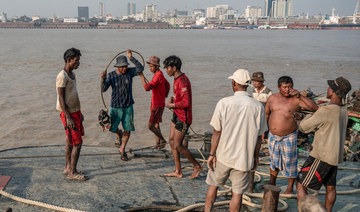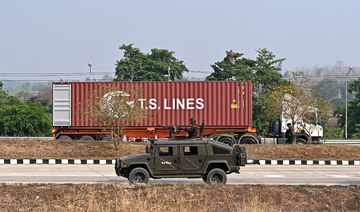KYIV, Ukraine: The wall of a major dam in a part of southern Ukraine that Moscow controls collapsed Tuesday after a reported explosion, sending water gushing downriver and prompting dire warnings of ecological damage as officials from both sides in the war ordered residents to evacuate.
Ukraine accused Russian forces of blowing up the dam and hydroelectric power station, while Russian officials blamed Ukrainian military strikes in the contested area.
The fallout could have far-reaching consequences: flooding homes, streets and businesses downstream; depleting water levels upstream that help cool Europe’s largest nuclear power plant; and draining supplies of drinking water to the south in Crimea, which Russia illegally annexed.
The dam break added a stunning new dimension to Russia’s ongoing war in Ukraine, now in its 16th month. Ukrainian forces were widely seen to be moving forward with a long-anticipated counteroffensive in patches along more than 1,000 kilometers (621 miles) of frontline in the east and south of Ukraine.
It was not immediately clear whether either side benefits from the damage to the dam, since both Russian-controlled and Ukrainian-held lands are at risk of flooding. The damage could also potentially hinder Ukraine’s counteroffensive in the south, while at the same time Russia depends on the dam to supply water to the Crimea region it annexed illegally in 2014.
Amid official outrage, Ukrainian President Volodymyr Zelensky said he convened an urgent meeting of the National Security Council. He alleged that Russian forces set off a blast inside the dam structure at 2.50 a.m. (2350 GMT) and said some 80 settlements were in danger.
Ukraine’s nuclear operator Energoatom said in a Telegram statement that the damage to the dam “could have negative consequences” for the Zaporizhzhia Nuclear Power Plant, which is Europe’s biggest, but wrote that for now the situation is “controllable.”
The UN’s International Atomic Energy Agency said in a statement there was “no immediate risk to the safety of the plant,” which requires water for its cooling system.
It said that IAEA staff on site have been told the dam level is falling by 5 centimeters (2 inches) an hour. At that rate, the supply from the reservoir should last a few days, it said.
The plant also has alternative sources of water, including a large cooling pond than can provide water “for some months,” the statement said.
Ukrainian authorities have previously warned that the dam’s failure could unleash 18 million cubic meters (4.8 billion gallons) of water and flood Kherson and dozens of other areas where hundreds of thousands of people live.
The World Data Center for Geoinformatics and Sustainable Development, a Ukrainian nongovernmental organization, estimated that nearly 100 villages and towns would be flooded. It also reckoned that the water level would start dropping only after five-seven days.
A total collapse in the dam would wash away much of the broad river’s left bank, according to the Ukraine War Environmental Consequences Working Group, an organization of environmental activists and experts documenting the war’s environmental effects.
Mykhailo Podolyak, a senior adviser to President Volodymyr Zelensky, said that “a global ecological disaster is playing out now, online, and thousands of animals and ecosystems will be destroyed in the next few hours.”
Videos posted online began testifying to the spillover. One showed floodwaters inundating a long roadway; another showed a beaver scurrying for high ground from rising waters.
The Ukrainian Interior Ministry called for residents of 10 villages on the Dnipro’s right bank and parts of the city of Kherson downriver to gather essential documents and pets, turn off appliances, and leave, while cautioning against possible disinformation.
The Russian-installed mayor of occupied Nova Kakhovka, Vladimir Leontyev, said it was being evacuated as water poured into the city.
Ukraine controls five of the six dams along the Dnipro, which runs from its northern border with Belarus down to the Black Sea and is crucial for the entire country’s drinking water and power supply.
Oleksandr Prokudin, the head of the Kherson Regional Military Administration, said in a video posted to Telegram shortly before 7 a.m. that “the Russian army has committed yet another act of terror,” and warned that water will reach “critical levels” within five hours.
Ukraine’s state hydro power generating company wrote in a statement that “The station cannot be restored.” Ukrhydroenergo also claimed that Russia blew up the station from inside the engine room.
Leontyev, the Russian-appointed mayor, said Tuesday that numerous Ukrainian strikes on the Kakhovka hydroelectric plant destroyed its valves, and “water from the Kakhovka reservoir began to uncontrollably flow downstream.” Leontyev added that damage to the station was beyond repair, and it would have to be rebuilt.
Ukraine and Russia have previously accused each other of targeting the dam with attacks, and last October Zelensky predicted that Russia would destroy the dam in order to cause a flood.
Authorities, experts and residents have for months expressed concerns about water flows through — and over — the Kakhovka dam.
In February, water levels were so low that many feared a meltdown at the Zaporizhzhia nuclear plant, whose cooling systems are supplied with water from the Kakhovka reservoir held up by the dam.
By mid-May, after heavy rains and snow melt, water levels rose beyond normal levels, flooding nearby villages. Satellite images showed water washing over damaged sluice gates.
Ukraine accuses Russia of destroying major dam near Kherson, warns of ecological disaster
https://arab.news/4zg75
Ukraine accuses Russia of destroying major dam near Kherson, warns of ecological disaster

- Both sides blamed the other for destroying the dam
- President Volodymyr Zelensky called an emergency meeting to deal with the crisis
Russia warns French troops legitimate targets if they are sent to Ukraine

- French president Emmanuel Macron caused controversy in February by saying he could not rule out the deployment of ground troops in Ukraine in the future
Macron caused controversy in February by saying he could not rule out the deployment of ground troops in Ukraine in the future. The French leader warned that if Russia wins in Ukraine then Europe’s credibility will be reduced to zero.
“It is characteristic that Macron himself explains this rhetoric with the desire to create some kind of ‘strategic uncertainty’ for Russia,” Russian Foreign Ministry Spokeswoman Maria Zakharova told reporters.
“We have to disappoint him — for us the situation looks more than certain,” Zakharova said.
“If the French appear in the conflict zone, they will inevitably become targets for the Russian armed forces. It seems to me that Paris already has proof of this.”
Zakharova said Russia was already seeing growing numbers of French nationals among those killed in Ukraine.
Russia said on Monday it would practice the deployment of tactical nuclear weapons as part of a military exercise after what the Moscow said were threats from France, Britain and the United States.
AstraZeneca says withdraws Covid vaccine ‘for commercial reasons’

LONDON: British drugmaker AstraZeneca said Wednesday that it has withdrawn its Covid vaccine Vaxzevria, one of the first produced in the pandemic, citing “commercial reasons” and a surplus of updated jabs.
“As multiple, variant Covid-19 vaccines have since been developed there is a surplus of available updated vaccines. This has led to a decline in demand for Vaxzevria, which is no longer being manufactured or supplied,” an AstraZeneca spokeperson said.
3 Indian men charged with killing Sikh separatist leader in Canada appear in court
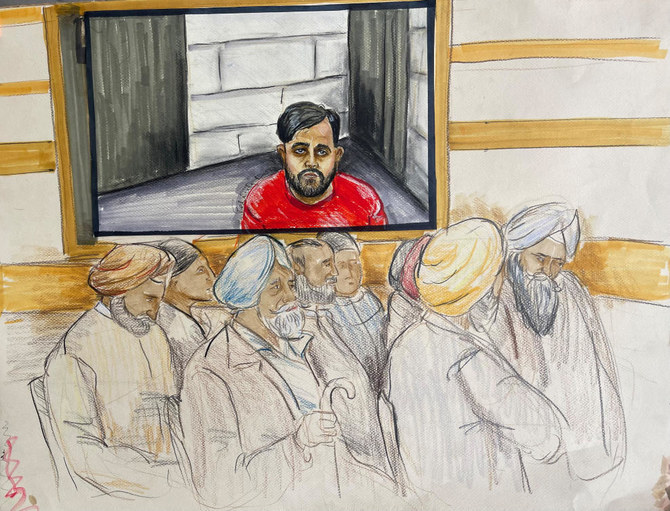
SURREY, British Columbia: Three Indian men charged with killing Sikh separatist leader Hardeep Singh Nijjar in British Columbia last year have appeared in court in the case that set off a diplomatic spat after Canadian Prime Minister Justin Trudeau said there were “credible allegations” of Indian involvement.
Canadian police had arrested the three Indian men last week in Edmonton, Alberta, and they have been charged with first-degree murder and conspiracy to commit murder.
Canadian Mounted Police Superintendent Mandeep Mooker said Friday that the investigation into whether the men had ties to India’s government was ongoing.
Nijjar, 45, was shot to death in his pickup truck last June after he left the Sikh temple he led in the city of Surrey. An Indian-born citizen of Canada, he owned a plumbing business and was a leader in what remains of a once-strong movement to create an independent Sikh homeland. India designated him a terrorist in 2020 and at the time of his death had been seeking his arrest for alleged involvement in an attack on a Hindu priest.
India has denied involvement in the slaying. In response to the allegations, India told Canada last year to remove 41 of its 62 diplomats in the country. Tensions remain but have somewhat eased since.
The arrested men — Kamalpreet Singh, 22, Karan Brar, 22, and Karanpreet Singh, 28 — appeared in court Tuesday via a video link and agreed to a trial in English. They were ordered to appear in British Columbia Provincial Court again on May 21.
Brar and Karanpreet Singh appeared in the morning. Kamalpreet’s appearance was delayed until the afternoon as he waited to speak to a lawyer.
The small provincial courtroom was filled with spectators during the morning session. Others crowded into an overflow room to watch the proceedings via video.
Richard Fowler, the defense lawyer representing Brar, said the case will eventually be moved to the Supreme Court and combined into one case.
About 100 people gathered outside the courthouse waving yellow flags and holding photos of Indian government officials whom they accuse of being involved in Nijjar’s killing.
Canadian police say the three suspects had been living in Canada as non-permanent residents.
A bloody decadelong Sikh insurgency shook north India in the 1970s and 1980s until it was crushed in a government crackdown in which thousands of people were killed, including prominent Sikh leaders.
The Khalistan homeland movement has lost much of its political power but still has supporters in the Indian state of Punjab, as well as in the sizable overseas Sikh diaspora. While the active insurgency ended years ago, the Indian government has repeatedly warned that Sikh separatists were trying to make a comeback.
UN: Myanmar displaced now at 3 million
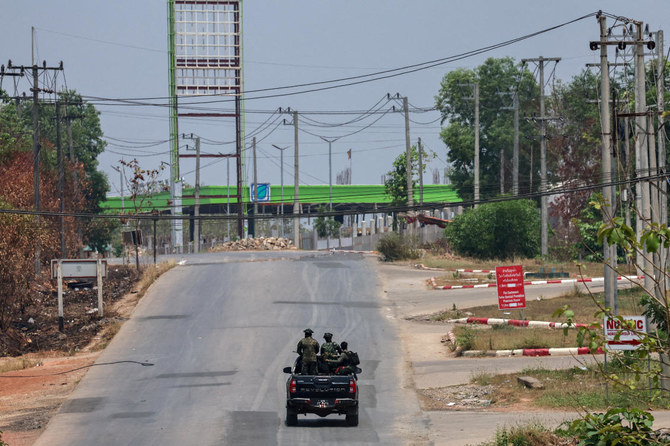
- An estimated one-third of those displaced are children, according to the UN statement
YANGON: The number of displaced people in Myanmar has reached three million, the United Nations said, the vast majority forced to flee their homes by conflict unleashed by the military’s 2021 coup.
Around 2.7 million have fled since the putsch that toppled Aung San Suu Kyi’s government after a short-lived experiment with democracy.
The coup sparked renewed clashes with established ethnic armed groups and birthed dozens of new “People’s Defense Forces” that the military has failed to crush.
“Myanmar stands at the precipice in 2024 with a deepening humanitarian crisis,” the UN’s resident coordinator in the country said in a statement released on Monday.
An estimated one-third of those displaced are children, according to the statement.
Around half of the three million have been displaced since late last year, when an alliance of ethnic armed groups launched an offensive across northern Shan state, the statement said.
The offensive seized swathes of territory and lucrative trade crossings on the China border, posing the biggest threat to the junta since it seized power.
Myanmar’s borderlands are home to a plethora of ethnic armed groups, many of whom have battled the military since independence from Britain in 1948 over autonomy and control of lucrative resources.
The UN said a severe funding shortfall was hampering its relief efforts, particularly ahead of the May-June cyclone season.
Last year cyclone Mocha smashed into western Myanmar’s Rakhine state, killing at least 148 people.
More than 355,000 people are currently displaced in western Rakhine state, which has been rocked since November by clashes between the Arakan Army and the military, the UN said.
Russian court says US soldier charged with theft causing ‘significant’ damage

- Detention of Gordon Black presents yet another diplomatic headache for the US
- The US soldier was detained in early May in Vladivostok, in Russia’s Far East
MOSCOW: US soldier Gordon Black, who has been detained the Russian city of Vladivostok until July 2, has been charged with theft causing significant damage, a Russian court said.
The detention of Black, who the Pentagon said traveled to Russia without authorization, presents yet another diplomatic headache for the United States, which has warned US citizens against all travel to Russia.
He was detained in early May in Vladivostok, in Russia’s Far East.
The Pervomaisky District Court of Vladivostok said in a statement that it had decided on the preventive measure to detain Black until July 2 for “secretly stealing the property of citizen T., causing the latter significant damage.”
“When choosing the preventive measure in the form of detention, the court came to the conclusion that US citizen B. (Black) — under the weight of the charges — could hide from the preliminary investigation authorities and the court to avoid responsibility,” the court said in the statement.
Earlier, the court’s press service identified the soldier as Gordon Black.
The Russian interior ministry in Vladivostok said on Tuesday that a 32-year-old woman had filed a complaint against the 34-year-old suspect.
The two had met in South Korea. The American had come to Vladivostok to visit her, the two had an argument, and she later filed a police report accusing him of stealing money, it said. He was arrested in a local hotel, having bought a plane ticket to return home.
The Pentagon said on Tuesday that before his arrest in Russia, Black not only broke Army rules by traveling to the Russian city of Vladivostok without authorization, but he did so after passing through China.



